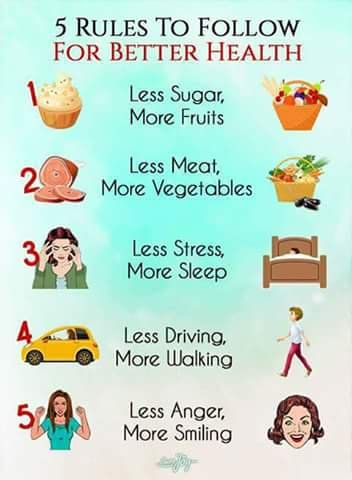
The following health tips will help you make the most of the year. Whether you are looking for a fresh start, or want to make some changes to your lifestyle, the new year is the perfect time to focus on making positive changes. Keep in mind that even dramatic changes in your health have to begin somewhere, so make sure to start small. Even the smallest changes you make now can make a difference in the future.
Plan your meals
The PMP 4-Week Meal Planning Challenge begins January 3, 2022. It is designed to help you make healthier choices and save money while creating a new routine. It's easy and anyone can get involved. Get a free meal plan and recipe card to help you plan your 2022 meals. View past challenges to get ideas and help with meal planning.
Meal planning is an excellent way to save money and make healthy choices for your family. Meal planning also allows you to try out new recipes and save time. Even if you share meals with others in your family, it's possible. But make sure to check allergies and plan out your meal times so everyone is on the same page. You'll be surprised how much money you'll save!
Drink plenty of water
You may be asking yourself why drinking more water is important. A dehydrated body can cause increased heart rate, decreased sweating and dry, itchy skin. It's also important to understand how dehydration can impact your body's functions, including hormones. Drinking water more often will improve the efficiency of your body's ability to absorb large amounts of fluids. You'll also notice a decrease in thirst.

There are many people who worry about the effects of water on your mental state. Even mild dehydration can affect your mental faculties. Research suggests that staying hydrated can reduce your chance of suffering from cardiovascular disease, which is the leading cause of death in this country. It also helps lower your risk of heart failure. People who don't drink enough water tend to have higher serum sodium levels, which cause the body to conserve water. This can eventually lead a person to develop heart failure.
More fruits and vegetables
The trend to eat more fruits and vegetables isn't new, but it's becoming more popular as consumers become more aware of the health benefits of foods. Consumers are more inclined to choose healthier produce. These new superfoods, especially in Western European and Northern European regions, are becoming more popular.
It is making people healthier and allowing them to experiment with new recipes. People are making smoothies, replacing rice with cauliflower and adding vegetables into their diets. Grocery stores and restaurants are offering more variety of fruit and vegetables, in an effort to improve consumer health. Whole Foods released two key food trends for 2022 in a trend report.
Read literary fiction
If you want to know how to read for health, consider the new voice in literary fiction, Raven Leilani. Her debut novel is tender and a must-read about the present we live in. Eric is a middle-aged white male who marries openly and has a daughter with a black mother. Eric regrets not having someone to teach her how she should do her hair. Eric meets some good friends who help him, and they discover they have a lot more in common than they thought.

While 2021 was a breakthrough year for literary fiction, the coming year looks to be equally exciting. These are the top books for 2022 that will help you kick start your reading year.
FAQ
What is the difference among a virus or a bacterium and what are their differences?
A virus is a microscopic organism which cannot reproduce outside of its host cell. A bacterium is an organism that splits itself in two. Viruses have a very small size (about 20 nanometers), while bacteria is larger (up to one micron).
Viruses spread easily through contact with infected bodily tissues, such as saliva and urine, semen, vaginal secretions or pus. Bacteria are often spread via direct contact with contaminated surfaces or objects.
Viral infections can be transmitted through skin cuts, scrapes and bites. They may also get into the body through the nose and mouth, eyes, ears or rectum.
Bacteria can enter the body through wounds. They may also come into our bodies through food, water, air, soil, dust, or animals.
Both bacteria and viruses cause illness. But viruses do not have the ability to multiply within their hosts. So they only cause illnesses when they infect living cells.
Bacteria can spread within the host and cause illness. They can spread to other parts of our bodies. They can even invade other parts of the body, which is why antibiotics are necessary to eradicate them.
How can I lower my blood pressure
Find out the causes of high blood pressure first. You must then take steps towards reducing the problem. These could include taking medication, eating less salt and losing weight.
Make sure you're getting enough exercise. If you don't have time for regular exercise, then try walking as often as possible.
You should join a gym if you are unhappy with your exercise routine. You will likely want to join an exercise group that shares your goals. It is easier to adhere to a fitness routine when someone else will be there with you.
What should I be eating?
You should eat lots of vegetables and fruits. These vegetables and fruits are rich in vitamins and minerals that will keep your immune system strong. Fruits and veggies are also high in fiber, which makes them filling and helps with digestion. Try to include at least five servings of fruit and veg per day.
Get plenty of water. Water flushes toxins from your body and helps you feel full between meals. Drink about eight glasses each day.
Whole grains are better than refined ones. Whole grains retain all nutrients including B vitamins, iron and zinc as well as calcium, magnesium, calcium, protein, and magnesium. Some nutrients have been removed from refined grains.
Sugary drinks should be avoided. Sugary drinks can be a source of empty calories, which can lead to obesity. Instead, you can opt for water or milk, as well as unsweetened herbal teas.
Avoid fast food. Fast food has very little nutritional value. You won't get the energy you need to function well, despite how delicious it may be. Instead, stick to healthier options such salads and soups as well sandwiches and pasta.
Reduce your alcohol intake. Alcohol is a poor nutrient and has empty calories. Limit yourself to no more than two alcoholic beverages a week.
Red meat should be cut down. Red meats contain high amounts of saturated fats and cholesterol. Lean cuts of beef or pork, lamb and chicken, as well as fish, are better choices.
Is cold an indication of a weaker immune system?
It is said that there are 2 types of people: those who love winter (and those who hate it). It doesn't matter if you love it or not, it is possible to wonder why it makes you feel so miserable when it gets cold outside.
The truth is that our bodies are built to work best when it's warm. Because of this, our bodies evolved to thrive and survive in hot climates.
Today's environment is vastly different from the one our ancestors experienced. We spend more time indoors, are exposed to extreme temperatures (cold/heat), and eat processed food rather than fresh.
Our bodies aren’t accustomed to such extremes. That means that when we do venture outdoors, we're left feeling tired, sluggish, and even sick.
These effects can be reversed, however. Staying hydrated is one way to combat this. If you drink plenty of water, you'll help keep your body properly hydrated and flush toxins from your system.
You must also ensure that you are eating healthy foods. The best way to maintain your body's optimal temperature is by eating nutritious food. This is especially helpful for people who spend a lot of time indoors.
It is worth taking a few extra minutes each day to meditate. Meditation can help you relax your mind, body and soul. This makes it easier to manage stress and illnesses.
Statistics
- This article received 11 testimonials and 86% of readers who voted found it helpful, earning it our reader-approved status. (wikihow.com)
- The Dietary Guidelines for Americans recommend keeping added sugar intake below 10% of your daily calorie intake, while the World Health Organization recommends slashing added sugars to 5% or less of your daily calories for optimal health (59Trusted (healthline.com)
- In both adults and children, the intake of free sugars should be reduced to less than 10% of total energy intake. (who.int)
- nutrients.[17]X Research sourceWhole grains to try include: 100% whole wheat pasta and bread, brown rice, whole grain oats, farro, millet, quinoa, and barley. (wikihow.com)
External Links
How To
What does "vitamin" actually mean?
Vitamins can be described as organic compounds found in food. Vitamins allow us to absorb nutrients from food. Vitamins are not made by the body, so they must be obtained through food.
There are two types if vitamins: water soluble, and fat soluble. Water soluble vitamins dissolve easily in water. These include vitamin C (thiamine), Vitamin B1 (riboflavin), Vitamin B2 (riboflavin), Vitamin B3 (niacin), Vitamin B6 (pyridoxine), Vitamin C, B1 (thiamine), Vitamin B2 (riboflavin), Vitamin B3 (niacin), and Vitamin B6 (pyridoxine). Fat-soluble vitamins are stored in the liver, fatty tissue and kidneys. Some examples include vitamin D and E, K, A and beta carotene.
Vitamins are classified according their biological activity. There are eight major categories of vitamins.
-
A - Essential for healthy growth and health maintenance.
-
C is important for nerve function and energy production.
-
D - necessary for healthy bones and teeth.
-
E is necessary for good vision, reproduction.
-
K - Required for healthy nerves and muscles.
-
P - essential for strong bones, teeth and tendons
-
Q - Aids digestion and iron absorption
-
R - necessary for making red blood cells.
The recommended daily allowance (RDA), for vitamins, varies depending upon age, gender, or physical condition. RDA values are set by the U.S. Food and Drug Administration (FDA).
For example, the RDA for vitamin A is 400 micrograms per dayfor adults 19 years or older. For fetal development, pregnant women need 600 mg per day. Children ages 1-8 require 900 micrograms per day. Infants below one year old require 700mg per day. But, between 9 months to 12 months, the amount drops to 500mg per day.
Children ages 1-18years who are obese need 800 micrograms per day while those who are overweight need 1000 micrograms per day and children who are underweight need 1200 micrograms per day to meet their nutritional needs.
Children 4-8 years old who have anemia must consume 2200 micrograms of Vitamin C daily.
2000 micrograms are required daily for good health in adults over 50. Breastfeeding or pregnant women require 3000 micrograms per daily due to higher nutrient demands.
Adults over 70 need 1500 micrograms daily, as they lose 10% of their muscle every ten years.
Women who are pregnant, nursing or breastfeeding need more than the RDA. Pregnant woman need 4000 micrograms daily in pregnancy, and 2500 per day after childbirth. Breastfeeding mothers need to consume 5000 micrograms every day when breastmilk has been produced.